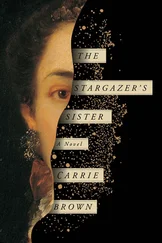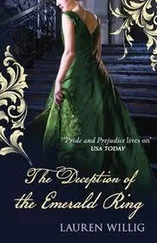Sir Walter approached, trailing in the wake of Miss Elliot, who parted the crowded floor like a ship’s figurehead, with Sir Laurence and Miss Ashford in tow.
“Here you are, Anne. Are you monopolizing the guest of honor? Sir Laurence has expressed a desire to meet our little future baronet. Alfred was out of sorts when the Ashfords arrived, but I see he is in better temper now. You have been holding him some time—here, let me take him from you.”
“But he is sleeping.”
“I can see that.” Miss Elliot reached for him.
“Indeed, Miss Elliot, you need not disturb him,” Sir Laurence said.
“A sleeping baby is such a heart-moving image that I cannot resist.” Miss Elliot snatched Alfred from Anne, lifting him right out of the blanket that had been loosely gathered around him. Strategically positioning him over the stain the infant had previously made on her gown, she attempted to rest him against her shoulder as Anne had done. Hers, however, was an awkward, insecure hold, not at all convincing her audience of her potential as a mother to a different future baronet—which, given that this sudden display of interest in the baby took place before Sir Laurence, Elizabeth recognized as Miss Elliot’s true purpose.
“There—see how he snuggles against me? He is such a sweet little thing.”
Until that moment, Elizabeth would have wagered a year’s worth of pin money that the word “snuggle” was entirely absent from Miss Elliot’s vocabulary. As it was, Miss Elliot appeared oblivious to the fact that Alfred was instinctively seeking the soft shoulder from which he had been so abruptly torn, not snuggling into the bony one upon which he had just been thrust. He squirmed, fully wakening, and released a mew that quickly turned into a full, incessant cry.
“There, now … little … darling.” Miss Elliot’s steely voice jarred Elizabeth more than the baby’s cries. “Do not cry for your sister—”
Miss Elliot’s eyes suddenly widened, and her countenance went rigid. She pulled the mewling infant away from herself and thrust him toward Mary. A damp, uneven circle now darkened another portion of her gown; the lower half of Alfred’s sported a matching one. “Would you kindly take this child from me?” Her strained voice came through clenched teeth.
Elizabeth, happening to meet Sir Laurence’s gaze, saw that she was not alone in working to conceal amusement.
Sir Laurence coughed. “I should … go seek Mr. Darcy. My sister and I have not yet spoken with him today. Unless, Miss Elliot, I can be of use to you?”
“No,” she said tightly, a scarlet flush creeping across her cheeks faster than the stain on her dress. Alfred, still in her hands, increased both his agitation and his volume. Sir Laurence bowed and withdrew with Miss Ashford.
Miss Elliot looked at her sister sharply. “Mary—”
“Why must I take him? He has already ruined your gown. I should sacrifice mine?”
As the sisters quarreled, Alfred’s high-pitched protests continued. Elizabeth itched to take him from Miss Elliot and offer the neglected baby what comfort she could, but she would not insert herself in a family dispute. Thankfully, Mrs. Wentworth stepped forward and reclaimed Alfred. She wrapped the blanket around him and held him close, murmuring soothing words, mindless of whatever indignity her own gown might suffer in consequence.
Miss Elliot looked down at the damp spot on her dress. The black fabric helped diminish its conspicuousness, but it was obvious nonetheless. “Where is Mrs. Logan? What sort of a nurse is she, who cannot even properly apply a napkin?”
“She is in our rooms at the Three Cups,” Sir Walter said. “Where else would she be—here, sipping lemonade with her betters? The inn is mere steps away; I told her I would send Alfred to her if she were needed.”
Anne’s face was incredulous. “Alfred has not fed nor had a fresh napkin since before church?”
“That was but a few hours ago,” Sir Walter said.
“It is little wonder he is so irritable.” Mary shook her head with an air of superiority. “Honestly,” she said to her eldest sister, “one would think you knew nothing about children.”
“That is because I do not have any. Yet somehow I have been saddled with responsibility for a small creature that does nothing but cry and ruin my clothes. Perhaps, Mary, since you possess so much more experience with children, you should take Alfred home to live with you.”
“At Uppercross Cottage? I am sure our father wants to keep his new heir closer to him than that.”
“As a matter of fact,” Sir Walter said, “that idea holds merit. We are quite cramped in our rooms here, and even when we return to Bath, a town house offers nothing compared to a country home in space for a growing boy.”
Mary suddenly had the look of a chased fox. “The cottage is already too small for our comfort—it is not as if we live in the Great House yet. Our own two boys—”
“Will be perfect companions for Alfred,” Miss Elliot said.
“… consume all my time as it is,” Mary finished. “You have no idea. I am a slave to their needs from sunrise till bedtime.”
“I thought you employ a nursery maid.”
“Of course we do.”
“Well, then, with Mrs. Logan’s assistance, the addition of Alfred will hardly be noticeable,” Miss Elliot declared.
Now Mary had the look of a cornered fox. She glanced at her other sister, hopeful of sympathy from that quarter, but Anne spoke only sibilant whispers as she swayed in a gentle rhythm that abated but could not eradicate the hungry infant’s distress. Mary turned an imploring look upon her father. “Anne has stayed with us at Uppercross. She can tell you how—”
Mary stopped. She glanced once more at Anne, longer this time, her gaze shrewdly contemplative.
“She can tell you how much better it would be for Alfred to live with her.”
Anne’s rocking and murmurs ceased as she regarded Mary in astonishment.
“Alfred, live with Anne?” Sir Walter sounded even more surprised than Anne appeared.
Miss Elliot seized upon the suggestion. “Yes, of course—Anne! Who better? She is married now, which makes her far more suitable than I to oversee his care.”
“Yet she has no children of her own to demand her attention,” Mary hastened to add. “She can devote herself fully to Alfred.”
“That is true…” mused Sir Walter.
“She is his godmother, after all,” Mary reminded them. “And Captain Wentworth, his godfather. Why, I should think that office alone obliges them to superintend his upbringing and education.”
“Indeed, I believe you have something there,” Sir Walter said. “Very well, Anne. I grant you permission to take Alfred home with you. I shall send his things to you, including Mrs. Logan, directly after this celebration concludes.”
At last, Anne found her voice. “Captain Wentworth and I are to raise Alfred? Are you quite certain, sir?”
“Yes, quite. Think you that I do not know my own mind? I shall have him for visits in Bath when he is old enough, to ensure he is prepared to take his proper place in society. But until then— Oh! Lady Dalrymple is departing. I must go see her off.”
“And I must return to the inn to change my gown,” Miss Elliot said.
Elizabeth noticed that she did not offer to take Alfred with her, so that his clothes could be changed, too. Sir Walter and Miss Elliot hurried away, the latter smiling smugly (as smugly as possible for a lady so unceremoniously perfumed) at this turn of events. Mary, realizing how narrowly she had escaped the addition of a third noisy boy to her household, found reason to scuttle off, as well.
Elizabeth was stunned. There was no doubt in her mind that the outcome of the discussion she had just witnessed was the best possible result for Alfred; of all the Elliot family, Captain and Mrs. Wentworth appeared the most capable, most conscientious, and most caring guardians Alfred could have. Yet Anne had acquiesced to a life-altering commitment without so much as a single word of dissent. At a minimum, one would expect her to consult her husband before agreeing to raise someone else’s child in their home. Whatever would Captain Wentworth say when she told him?
Читать дальше












